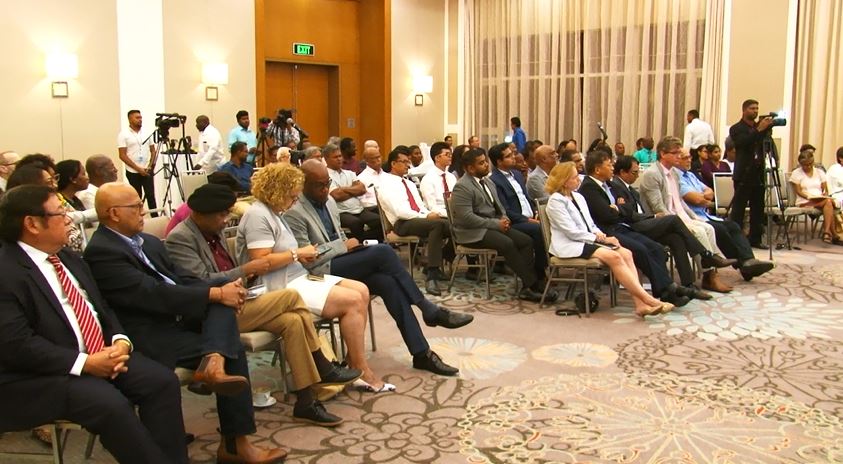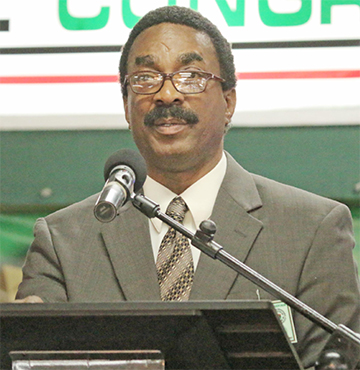https://citizensreportgy.com/?p=12320
The People’s Progressive Party (PPP), in a statement, “…condemns the threats of violence made by Attorney General Basil Williams, during a panel discussion organised by the American Chambers in Guyana (AmCham Guyana) on Monday (August 5, 2019). Williams threatened “dire consequences” if house-to-house registration is not allowed to proceed – fallaciously insisting that house-to-house registration is the only means of obtaining a credible Voters’ List and disingenuously ignoring the constitutional three-month deadline for Elections to be held in Guyana.”
Notably, according to the PPP, “…President David Granger is ultimately responsible for such reckless comments. It is clear that he opts to present a disposition that is above reproach while he dispatches his minions to engage in a campaign that does nothing, but harm to our nation.”
Further, the PPP warned that “If this unsupervised, unconstitutional and illegal process, currently the subject of a court challenge, is allowed to continue – producing what will undoubtedly be a flawed List of Voters – there will be no need for the organised violence that is typical of the People’s National Congress Reform’s leadership, which could be the only thing that Williams was referring to. There is already anger among Guyanese about the unconstitutional nature of the ongoing house-to-house registration and the refusal of the APNU+AFC Coalition to comply with the Constitution and the orders of the Caribbean Court of Justice. This anger could spill over into spontaneous and regrettable violence, if there is mass de-registration, as the current direction of the house-to-house registration indicates. This is an outcome that must be avoided by ensuring that there is constitutional compliance.”
Below is the full statement from the PPP:
The People’s Progressive Party (PPP) condemns the threats of violence made by Attorney General Basil Williams, during a panel discussion organised by the American Chambers in Guyana (AmCham Guyana) on Monday (August 5, 2019). Williams threatened “dire consequences” if house-to-house registration is not allowed to proceed – fallaciously insisting that house-to-house registration is the only means of obtaining a credible Voters’ List and disingenuously ignoring the constitutional three-month deadline for Elections to be held in Guyana.
Williams said, “They are willing to go to the Election with an anyhow list. They are ready for their properties, and all these things, to be subjected to those same post-election type of violence that we had in the past. I don’t want to say well y’all go, go to the Election, because the consequences would be dire.”
This is not the first time that the Attorney General has descended to such talk. In May 2019, Williams warned about “unrest” that might follow in Guyana if the Caribbean Court of Justice (CCJ) rules against the Government in the three consolidated cases, related to the challenge to the validity of the no-confidence motion passed on December 21, 2018.
The Party firmly believes that President David Granger is ultimately responsible for such reckless comments. It is clear that he opts to present a disposition that is above reproach while he dispatches his minions to engage in a campaign that does nothing, but harm to our nation.
As currently being done, house-to-house registration will de-register countless Guyanese, imposing demands on eligible Guyanese that are unconstitutional.
If this unsupervised, unconstitutional and illegal process, currently the subject of a court challenge, is allowed to continue – producing what will undoubtedly be a flawed List of Voters – there will be no need for the organised violence that is typical of the People’s National Congress Reform’s leadership, which could be the only thing that Williams was referring to. There is already anger among Guyanese about the unconstitutional nature of the ongoing house-to-house registration and the refusal of the APNU+AFC Coalition to comply with the Constitution and the orders of the Caribbean Court of Justice. This anger could spill over into spontaneous and regrettable violence, if there is mass de-registration, as the current direction of the house-to-house registration indicates. This is an outcome that must be avoided by ensuring that there is constitutional compliance.
None other than the Chief Elections Officer (CEO), Keith Lowenfield, has admitted on two occasions that a Claims and Objections period will ensure a credible list to facilitate the holding of constitutionally mandated Elections. He also admitted that President Granger’s claim about the List of Voters being bloated by 200,000 is spurious.
Many have been misled into believing that the house-to-house registration, to produce a new National Register of Registrants, will be completed on October 20, 2019. ONLY the field exercise of this process will be completed by that date. According to GECOM’s own work plan, the entire exercise to produce a new National Register of Registrants was programmed to end on December 18, 2019, but its start was delayed by 48 days – meaning that the new end date will take Guyana to February 2020, just to get a new National Register of Registrants. Once this is done, it will take an additional several months to arrive at an Official List of Electors.
The caretaker Coalition Government cannot continue to ignore the consequence of the successfully and validly passed no-confidence motion – that is Elections by September 18, 2019.
Additionally, the ongoing legal challenge to house-to-house registration – one that challenges the constitutionality of the process – is likely to end up before the Caribbean Court of Justice. If houseto-house registration is pursued and results in a flawed List of Voters, which it will, there can be an impact on any Election that is held. If an Election is held with a flawed List and the CCJ rules that house-to-house registration is unconstitutional, the Election could be invalidated.
Guyana can ill-afford continued political upheavals.
That said, it is for GECOM to urgently pursue Claims and Objections as a tested method for updating the existing List of Voters – a method used for the 2018 and 2016 Local Government Elections, as well as the 2015 and 2011 General and Regional Elections – to allow for Elections to be held within the constitutionally mandated three-month timeframe.




